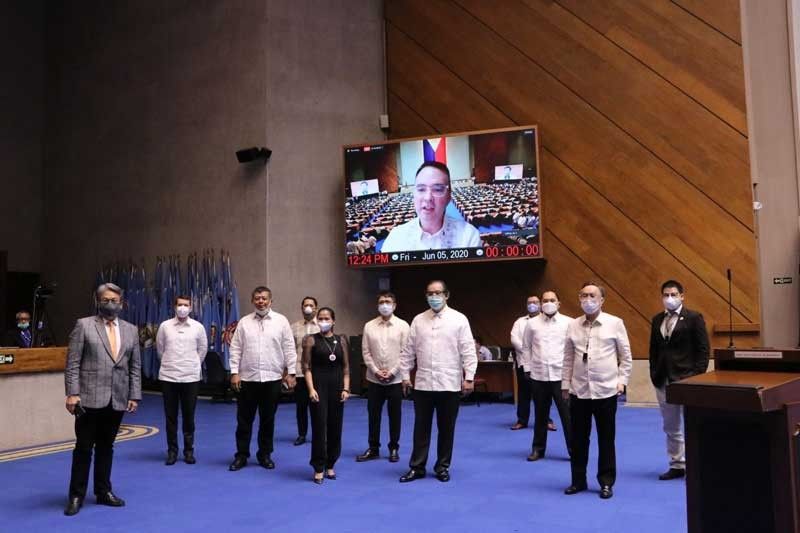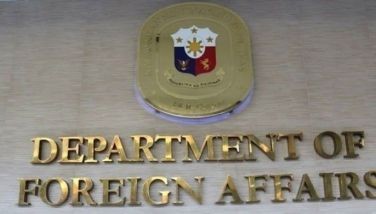UP, Letran professors slam 'ambiguous' anti-terror bill

MANILA, Philippines — Certain provisions outlined in the pending anti-terror bill are prone to abuse of authority while other water down existing safeguards from such, ranking educators and leaders from the University of the Philippines and Colegio de San Juan de Letran said.
In a position paper published Saturday evening, the UP Department of Political Science expressed its "vehement objection" to the controversial anti-terror bill pending President Rodrigo Duterte's signature, saying its ambiguity widened the risks of abuse of authority and that it did not sufficiently protect the rights of the accused.
The department is a Commission on Higher Education (CHEd) Center of Excellence in Political Science.
"Under the proposed law, what qualifies as an act of 'terrorism' has been expanded and can be subject to a variety of interpretations. Ambiguity in the definitions of 'terrorist' and the 'acts of terrorism' may lead to the abuse of authority, especially when substantive institutional oversight is reduced," the paper read.
"The accused may be rendered clueless about what is happening. With limited information, the accused may not be able to respond properly to any accusations lodged against him or her. This may also constitute a violation of the right to due process. The so-called “safeguards” usually do not protect the poor and the powerless," it added.
"The reduction of oversight power opens the possibility of abuses in the implementation of the law. Instead of serving as checks on the powers given to the executive, the other branches of government become accomplices to the systematic disenfranchisement of rights."
RELATED: Ateneo, La Salle school heads oppose 'ill-timed' anti-terror bill
Under the bill, the Anti-Terrorism Council can authorize the warrantless detention of people suspected of being terrorist for up to 24 days with no requirement to present the suspect before any judge, while the period of surveillance, which can include following individuals and wiretapping their conversations, is extended from 30 to 60 days.
"These provisions encroach upon the rights to communication and privacy of the people that this state has sworn to serve and protect...This can lead to an investigation-spree by the AMLC, under the instruction of the ATC, of political enemies, critics, and vocal opposition to any administration," the professors said.
The Department of Interior and Local Government, which is under the law's Anti-Terrorism Council, earlier assured that the anti-terror law’s safeguards were enough to protect against its misuse in the same breath as it conflated legal activist groups with communist rebels.
As it stands, the government's National Task Force to End Local Communist Armed Conflict, which has been caught peddling misinformation more than once, has listed a number of activist groups as communist front organizations.
'What demands this kind of urgency?'
Even after criticisms were hurled against the also-passed Senate iteration of the bill in February, the chief executive certified its proposal as urgent amid the ongoing novel coronavirus pandemic, prompting numerous groups to march in protest against the bill.
In their position paper, the UP professors also slammed what they called the "violent dispersal of peaceful protestors" at UP's Cebu campus.
"We are also gravely concerned with the timing and mode of the passage of this bill. In the middle of a pandemic, Congress chose to prioritize an anti-terror law, thereby instilling fear instead of compassion. Moreover, critical decisions have been made in a span of days—definitely a short period for a measure needing much scrutiny," the professors said.
"Has there been a thorough review of the existing provisions and careful deliberation of the proposed amendments? What demands this kind of urgency especially under a public health emergency?" they added.
This sentiment was echoed in a separate statement by the Dominican Family Commission for Justice, Peace and Care for Creation, which read: "The passage of the bill in both houses of Congress did not allow people to openly and adequately participate in the consultation and discussion which are requisite for such important legislation. Worse, it was passed at this time, when we are all struggling against COVID-19 pandemic."
READ: Statement of the Dominican Family Commission for Justice, Peace and Care for Creation on the passage of the Anti-Terrorism Law.
— LETRAN MANILA (@LetranOfficial) June 6, 2020
The Statement is also signed by Rev. Fr. Clarence Victor Marquez, OP, the Colegio's rector and president. pic.twitter.com/0pkuvMM2HV
The statement was signed by Rev. Fr. Clarence Victor Marquez, the rector and president of Colegio de San Juan de Letran.
It went on: "There are many provisions in the bill that are clearly contraposed to the 1987 Philippine Constitution and the standards of international law and human rights. Specifically, the bill is objectionable in its provision on unregulated surveillance power and uninformed denial of the rights to liberty, information, privacy, compensation, infringement on the freedom of opinion, freedom of speech, freedom of expression, freedom of the press, the right to peaceful assembly and to express dissent and grievance against government."
"While terrorism, as defined in the bill, excludes advocacy, protest, dissent, stoppage of work, industrial or mass action, and other similar exercises of civil and political rights, there are dangers as regards the manner in which the powers to deal with terrorism are left in the hands of the executive branch. If abused, the law can be used to instill fear among the critics of any administration—a weapon like no other," the UP professors added.
Justice Secretary Menardo Guevarra has said that the justice department would be looking at whether the provisions of the bill are in accordance with the 1987 Constitution.
Even international groups have slammed the bill, including the United Nations, Greenpeace, and the International Coalition for Human Rights in the Philippines.
The enrolled bill, or its final version having hurdled Congress, only needs Duterte's signature before being passed into law.
"We are urging our lawmakers to withdraw support for this bill, to listen to the people, and prevent its passage into law. Let us open the space to study, to consult, to subject it to enlightened debate and discussion, towards an inclusive consensus for the good of our people," the statement from the Dominican Family Commission wrote.
- Latest
- Trending


































